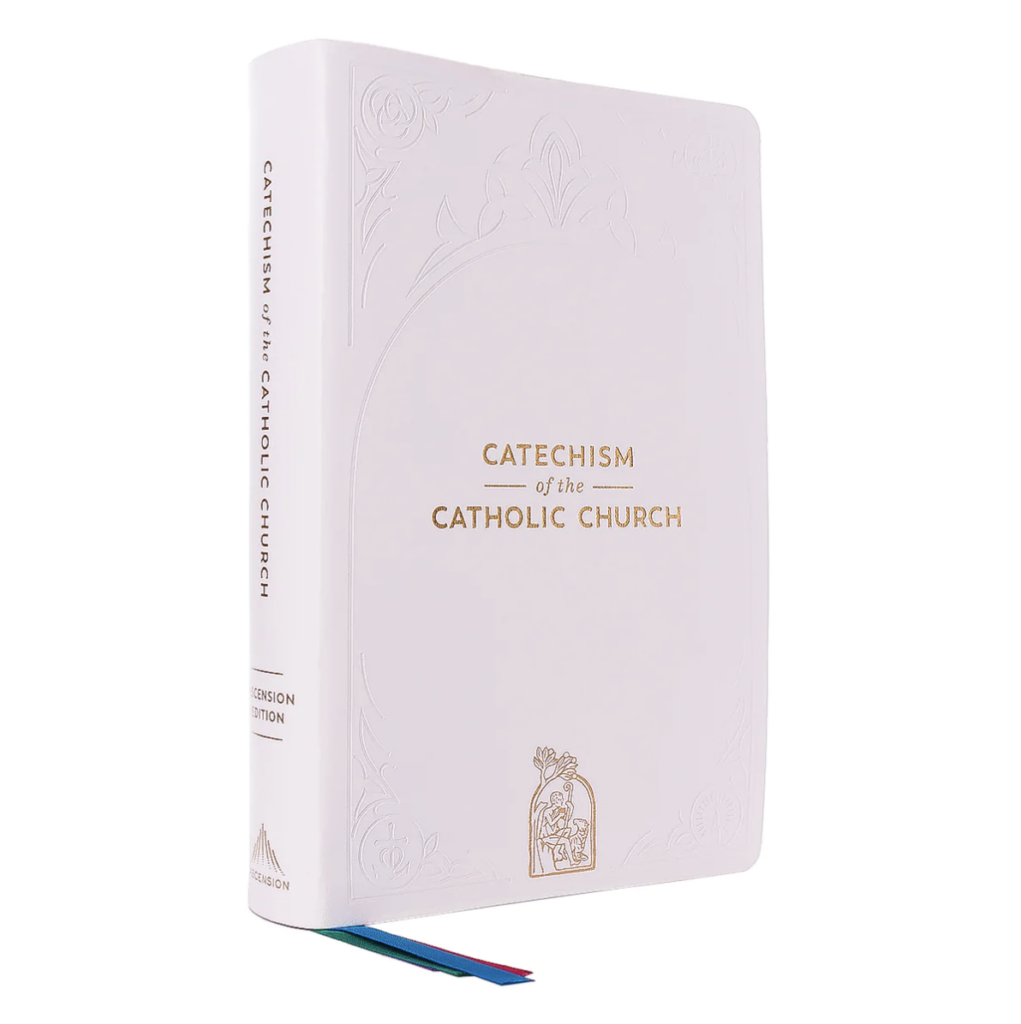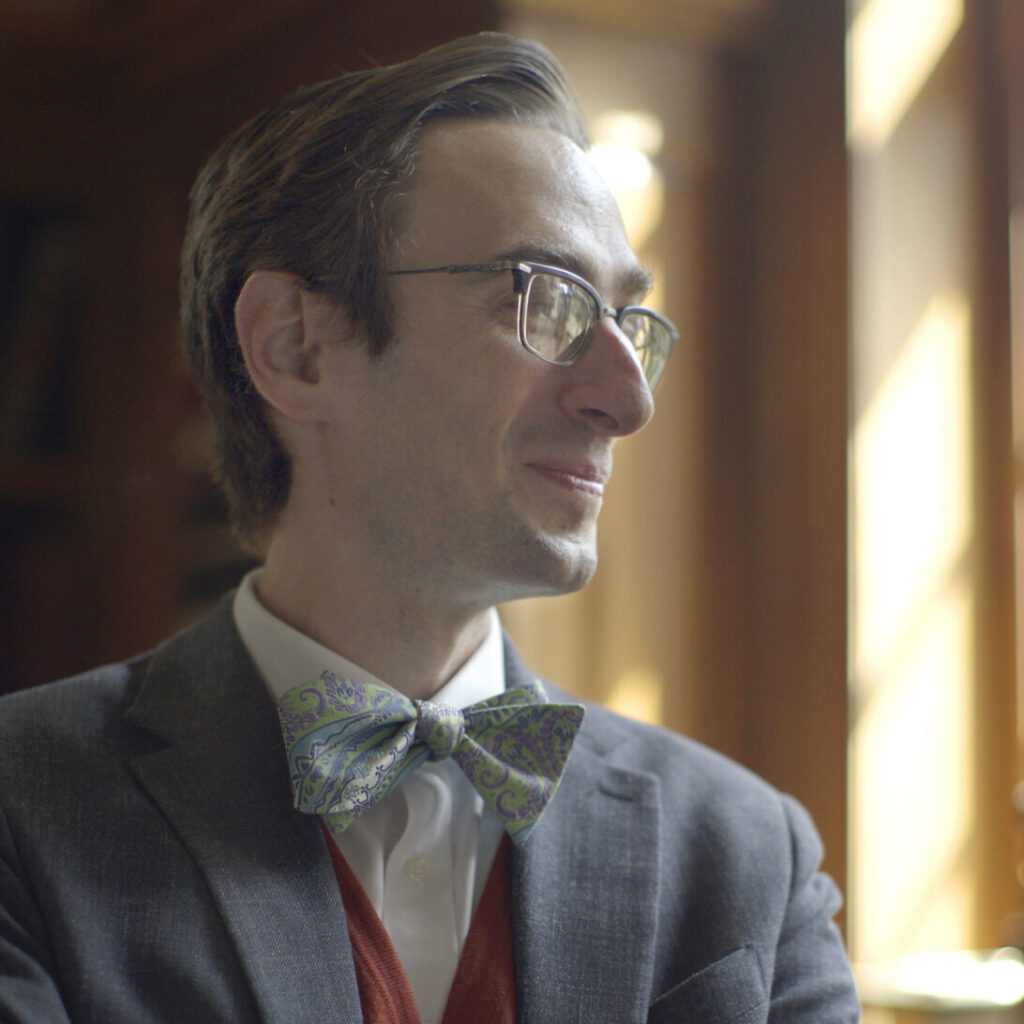This is the eighth part of a series that follows The Catechism in a Year podcast. Dr. Matthew Minerd journeys with us and presents a “travel guide” through the major themes of the Catechism of the Catholic Church.
Need to catch up? You can find the other parts of the series here: The Catechism: A Guide for the Christian Life, Divine Revelation, A God Who Reveals Himself, Creation and the Fall, The Son, The Holy Spirit, and The Church.
With the coming of Jesus Christ, the end of time has already begun. His life, death, resurrection, and ascension mark the “fullness of time.” The ultimate meaning of human history is found in Jesus, through whom and for whom all things were created (see John 1:1–10; Colossians 1:16). In the gift of grace, which flows from Christ’s victory over sin and death, eternity begins now:
“Behold, now is the acceptable time; behold, now is the day of salvation.”
2 Corinthians 6:2
As St. Thomas Aquinas says so beautifully:
“Grace is nothing other than a beginning of glory in us.”
It is important that we internalize the profound truth that Jesus Christ has won the victory, once and for all. By his death and resurrection, he has conquered death, becoming the source of life for all who believe in him and are baptized into his victorious self-offering:
“Baptism … now saves you, not as a removal of dirt from the body but as an appeal to God for a clear conscience, through the resurrection of Jesus Christ.”
1 Peter 3:21–22
As St. Paul tells us, Jesus’ resurrection is the cause of our own:
“Christ has been raised from the dead, the first fruits of those who have fallen asleep, for as by a man came death, by a man has come also the resurrection of the dead.”
1 Corinthians 15:20–21
Through his sacred humanity, raised in glory and made present through the Church, his mystical body, he is active always and everywhere. At every moment, Jesus is present to the hearts of all, desiring the salvation of every person (see 1 Timothy 2:4).
How wonderful, yet also dreadful, is human freedom! The great wonder is that we are free to receive the gift of divine life, like “a spring of water welling up to eternal life” (John 4:14). But the dreadful mystery is that we are also free to reject this divine love through sin. The resurrection of Christ, though, cuts straight through our freedom, opening our hearts and laying bare all that may be found there:
“For the word of God is living and active, sharper than any two-edged sword, piercing to the division of soul and spirit, of joints and marrow, and discerning the thoughts and intentions of the heart.”
Hebrews 4:12–13
Death and Destiny
The first great division will take place at death, when each of us will immediately come face-to-face with our destiny. This outcome is based upon the questions: Did we cultivate the seed of grace sowed in our heart (see Matthew 13:1–9, 18–23)? Did we love God above all else, sharing in his love, which has been “poured into our hearts through the Holy Spirit which has been given to us” (Romans 5:5)? Did we love our neighbors with this same love?” As St. John tells us:
“If anyone says, ‘I love God,’ and hates his brother, he is a liar; for he who does not love his brother whom he has seen, cannot love God whom he has not seen.”
1 John 4:20
In short: Was our heart animated by God’s abundant love or was it turned in on itself in self-love?
From the Lord, each of us will hear his particular judgment of our life:
“Come, O blessed of my Father, inherit the kingdom prepared for you from the foundation of the world … [or] Depart from me, you cursed, into the eternal fire prepared for the devil and his angels…”
Matthew 25:31–46
At that moment, our eternal destiny is fixed—heaven or hell. For those who are judged worthy of heaven, the glory will be wholly God’s. They will know, better than we do on earth, that we lowly “earthen vessels” bear witness to the fact that “the transcendent power belongs to God and not to us” (2 Corinthians 4:7). As for the damned, the blame will lay solely with them, for they withdrew from God’s love, abusing their freedom, which is made to love God above all things. During their life on earth, their moral universe was themselves; now, for eternity, they will turn inward to their own nothingness and will suffer the just retribution of punishment that they deserve. This fate is hell, “where their worm does not die, and the fire is not quenched” (Mark 9:48).
The Fulfillment of All Desires
Among those who are welcomed into the glory of God, some will immediately see him face-to-face—and their hearts will be filled with the abundance of his love. Since we have been made in the image and likeness of God (see Genesis 1:26), the blessed will now reflect the radiance of God for which they have been created:
“We know that when he appears we shall be like him, for we shall see him as he is.”
1 John 3:2
The radiant dawning of the eternal day will fill their hearts and minds, in fulfillment of the promises the Lord made to his people, who had long awaited this glory. This is the eternal life of heaven, the fulfillment of all desires.
Purification
Many who love God, though, and die in his grace will be marked by the imperfection of the love they exercised during their earthly lives. Their souls are still stained by the venial sins that they committed. This imperfection must be burned away, so that their love of God and neighbor might be purged of whatever contaminates it. Their love must be made perfect for them to enter into the presence of God. This period of purification is known as purgatory. It is a kind of “foyer” to heaven. These souls have been saved, but their hearts must be purified so that they can experience the full measure of the divine life they will live in eternity.
The Resurrection of the Body
As Jesus was raised bodily from the dead, all await the resurrection of the body. This will occur at the Last Judgment, when the number of ages assigned by God has run its course. With everyone who has ever lived assembled, the Lord will say:
“It is done! … He who conquers shall have this heritage, and I will be his God and he shall be my son. But as for the cowardly, the faithless, the polluted, as for murderers, fornicators, sorcerers, idolaters, and all liars, their lot shall be in the lake that burns with fire and sulphur, which is the second death.”
Revelation 21:6–8
This is the time of the resurrection of the body.
All human souls, both those who are saved and those who are condemned, will be miraculously reunited with their bodies. The saved will radiate the divine life in their bodies. Every aspect of their person will be flooded with the glory of the vision of God. It will pour forth from their spirit throughout their entire body. The damned, however, will experience the pains of hell in their bodies as well as their souls. They will feel every memory and every image bodily, and they will be tortured with their self-centered thoughts and desires forever.
The New Jerusalem
In heaven, the very reason why humanity was created—eternal communion with God and one another— will find its fulfillment. In the Garden of Eden, our first parents scorned this gift of life and set in motion the whole history of humanity thereafter. For all the ages before the coming of Christ and the centuries that have followed, “the whole creation has been groaning in travail together” (Romans 8:22) awaiting man’s final salvation, which will also return order to the whole cosmos. Now, at the end of all things, God’s great “rescue mission” will find its fulfillment. As “a new heavens and a new earth” (Revelation 21:1), this resurrected and renewed creation will be the final, eternal dwelling place of humanity with God. This “new Jerusalem” will be not be a city of brick and stone but a living edifice, made up of all the saints and angels. It will be the Church, the bride of Christ, in full splendor, and all eternity will be like a great wedding banquet, where the “food” is the very life of God, shared in communion with all those who receive the glorious vision of him (see Revelation 21).
This heavenly glory is the full flowering of the mystery of the Church’s life. It is the “whole Christ,” the fulfillment of his redemption for all ages. In the present age, though, we experience the truths of faith as great mysteries, covered by veils, above all the veils of the liturgy and the sacraments, veils that at once conceal and nonetheless reveal the mystery to us.

Understand the Catholic Faith Like Never Before
This exclusive, specially designed Ascension edition of the Catechism clearly shows the ancient roots of the Faith and helps Catholics integrate the fullness of Catholic teaching into their daily lives.

Dr. Matthew Minerd is a Ruthenian Catholic, husband, and father, serving as a professor of philosophy and moral theology at the Byzantine Catholic Seminary of Saints Cyril and Methodius in Pittsburgh. His academic and popular writing has been published in the journals Nova et Vetera, The American Catholic Philosophical Quarterly, The Review of Metaphysics, Études Maritainiennes, Downside Review, and Homiletic and Pastoral Review. He has also served as a translator or editor for volumes published by The Catholic University of America Press, Emmaus Academic, and Cluny Media. He is the author of Made by God, Made for God: Catholic Morality Explained.






0 Comments